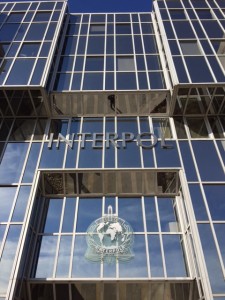Today’s CBRA Interview is with Mr. Mike Ellis who is the Assistant Director of Illicit Trade and Anti-counterfeit Sub-crime Directorate at INTERPOL, Lyon, France.
Hi Mike, can you first tell a bit who are you and what you do?
I am the Assistant Director for Police Services at INTERPOL, based in Lyon France. INTERPOL is the world’s largest international police organization. Our role is to assist law enforcement agencies in our 190 member countries to combat all forms of transnational crime. We work to help police across the world meet the growing challenges of crime in the 21st century by providing a high-tech infrastructure of technical and operational support. Our services include targeted training, expert investigative support, specialized databases and secure police communications channels. I am responsible for the coordination of all activities related to illicit trade, smuggling of illicit goods and counterfeiting for the organization and police forces within our 190 member countries. I lead a team of expert officers who are engaged in training, capacity building, and operational support who operate along with my analytical support who manage risk awareness and intelligence handling.

From your perspective, how bad is the current situation with counterfeit and other illicit trade in global supply chains? Can one for example see links between illicit trade and transnational organized crime groups; or, even terrorist organizations?
For many years the clear link has been established between the trafficking of illicit goods and transnational organized crime. Criminal organizations are attracted by the lucrative profits involved in trading counterfeit or fake goods, or in trading legitimate goods through illicit channels. The criminals involved manufacture and trade illicit goods on a regional and increasingly global scale. It is well documented that they use the profits to fund other criminal activities such as drug trafficking and people smuggling, and for investment into funding subversive political groups. Selling fake or counterfeit products is one aspect of illicit trade, as is selling genuine goods on the black market to avoid paying taxes. By avoiding regulatory controls, the criminals behind these activities peddle dangerous and illicit goods with a complete disregard for the health and safety of consumers. The phenomenon has grown to an unprecedented level, posing tremendous risks to society and the global economy. Counterfeiting harms businesses which produce and sell legitimate products, governments lose tax revenue from products manufactured or sold on the black market, and consumers are at risk from substandard products.
By the way, we met first time about one year ago in Lyon at an INTERPOL workshop linked to FP7-Project CORE. One of the main objectives of CORE-project is to develop leading edge education and training materials on supply chain security – for the benefit of law enforcement agencies, supply chain practitioners, and academics alike. Can you share your views about law enforcement – academia – industry cooperation in education material development, as well as in the broader field of supply chain security management?
One of our principle functions is capacity building and training. At INTERPOL we recognize that capacity building brings with it raised identification of the impact of illicit cross-border trade and counterfeiting and all our new operations, or established operations in new regions, are preceded by a capacity building workshop. The public domain is represented by police, customs, border control officials, and prosecutors, as well as representatives from various regulatory bodies including trading standards. In addition, INTERPOL TIGC, the Trafficking in Illicit Goods and Counterfeiting program which I am heading, has developed a Mentoring Program which aims to increase cross-border, cross-industry law enforcement operational interventions by: strengthening capacity to deal with all types of cross-border trafficking in illicit and counterfeit products. We have also developed an online International Intellectual Property Crime Investigator’s College and have built already a robust network of over 10.000 law enforcement officers, and partner stakeholders with specialist knowledge and skillset. This online training course provides specialist knowledge on transnational organized crime. It is aimed at all law enforcement officials, regulatory authorities and private sector investigators who are committed in the fight against illicit trade and intellectual property crime. We aim to provide crime professionals with specialist awareness and learning on the subject of transnational organized intellectual property, IP, crime, and illicit trade, by delivery of leading-edge training that meets international standards and allows crime investigators from any discipline to quickly identify other certified investigators. Through this learning platform we also facilitate cooperation between the public and private sectors in the fight against IP crime, and ensure all public and private sector crime investigators have a common understanding of the problems facing them, while being aware of each other’s competencies and roles. We seek to promote knowledge on what intervention strategies and tactics work, in order that all stakeholders are better able to work together in partnership in enforcement operations.
Thank you Mike for this highly interesting interview. It complements well our previous interviews on similar themes – with non-law enforcement experts including Mr. David Hamon and Mr. Tony Barone. CBRA and the whole FP7-CORE consortium, around 70 partners in total, wishes to continue the great cooperation in research and education material development with INTERPOL, throughout the CORE-project, until April 2018 – and beyond! Juha.


